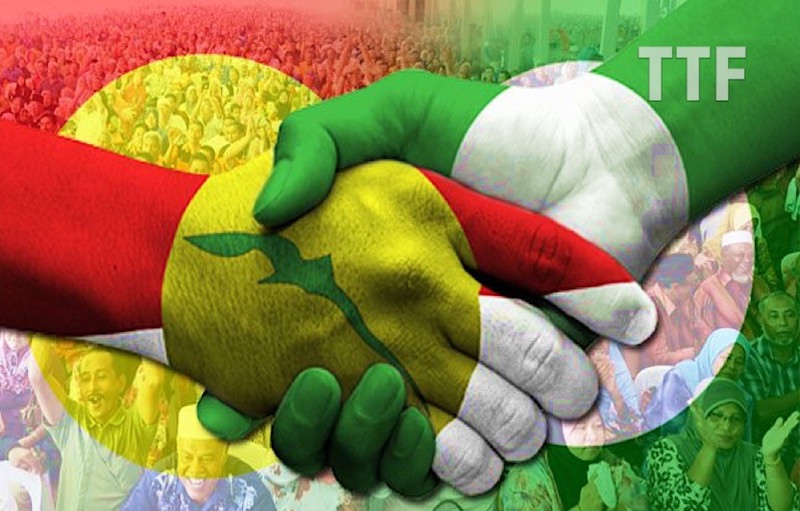
Tomorrow, Umno and PAS will sign a charter solidifying the political relationship between the once-bitter rivals in the lead up to the next polls, the climax of the Himpunan Penyatuan Ummah (Muslim Unity Gathering) that is meant to unite the Malay-Muslim community.
Universiti Malaya’s Malay Studies Academy deputy director Awang Azman Awang Pawi believed that PAS and Umno’s rise in popularity among some Malays is mainly due to the “racialisation” of economic issues like youth employment and government pensions.
He said Bumiputera, especially rural Malay-Muslims, have lost faith in the present government due to its handling of issues like the introduction of khat calligraphy lessons in schools, and the International Convention on the Elimination of All Forms of Racial Discrimination (ICERD).
Meanwhile, Universiti Utara Malaysia’s political analyst Kamarul Zaman Yusoff said he expects the rally to be a foundation for both PAS and Umno leaderships to bury the hatchet and exhibit their readiness to mount a challenge against PH in the next election.

KUALA LUMPUR: Tomorrow, Umno and PAS will sign a charter solidifying the political relationship between the once-bitter rivals in the lead up to the next polls, the climax of the Himpunan Penyatuan Ummah (Muslim Unity Gathering) that is meant to unite the Malay-Muslim community.
But on the first day of the event today, both parties will hold joint programmes at Umno’s headquarters at the Putra World Trade Centre here, in perhaps what is a sobering moment for Malaysian politics — or at the very least for these two parties that had one point vehemently opposed one another.
This will lead to the peak of the planned gathering tomorrow, with grassroots members of both parties coming together via a mega rally to showcase the new union’s might, and also a potential threat to the ruling Pakatan Harapan (PH) coalition.
While some would be quick to dismiss the alliance between the two Malay parties as one borne out of necessity, and the need to form a cohesive opposition coalition to keep PH in check, the fact remains that there appears to be a disconnect between the ruling coalition and ordinary Malaysians, particularly the Malay community.
And this has partly resulted in a resurgence of support for the Islamist and nationalist parties, ever since they started promoting the idea of combining forces for the sake of Malay-Muslim unity.
The reason some voters still root for Umno and PAS
Universiti Malaya’s Malay Studies Academy deputy director Awang Azman Awang Pawi believed that PAS and Umno’s rise in popularity among some Malays is mainly due to the “racialisation” of economic issues like youth employment and government pensions.
“This alliance between them is a social mechanism born to balance the inequality in terms of economic and social concerns in the society,” the associate professor told Malay Mail, referring to the two parties.
Acknowledging that certain quarters are worried about the rise of racism and right-wing politics, Awang Azman said the alliance between both Malay parties as well as the support for them should not be looked at from a political perspective exclusively, rather as a “social Bumiputera” issue as a whole.
He said Bumiputera, especially rural Malay-Muslims, have lost faith in the present government due to its handling of issues like the introduction of khat calligraphy lessons in schools, and the International Convention on the Elimination of All Forms of Racial Discrimination (ICERD).
While PH dithered on these matters, PAS and Umno’s clear stance makes them clear favourites among some Malays.
“This is the manifestation [of Bumiputera] worries about the current situation, when the economy isn’t favourable and other issues that are not solved by the government.
“We can’t just look at this politically, but we see this as a Bumiputera issue,” he said.
Awang Azman added that PH should review the situation on the ground if they do not want to continue losing support from the Malay and Bumiputera majority that accounts for about 62 per cent of the population.
Citing history, he said the Malays have been willing to protest against the government when they are concerned about economic issues.
“We saw this in the 1930s when there was a Malay movement from [journalist] Rahim Kajai and [writer] Zaaba inciting the Malays through their works in the newspapers and books to increase their economic advantage.
“There are improvements and institutional reforms by Pakatan, but people are more concerned with bread and butter issues. If it can tackle that, then it will get their support,” he said.
Meanwhile, Universiti Utara Malaysia’s political analyst Kamarul Zaman Yusoff said he expects the rally to be a foundation for both PAS and Umno leaderships to bury the hatchet and exhibit their readiness to mount a challenge against PH in the next election.
“I believe that Umno and PAS will be expected to expose all of Pakatan Harapan’s mistakes in the rally.
“I expect that there will be euphoria and general happiness over this alliance from the leadership of Umno and PAS as they will try to show they are ready to take over the government,” he told Malay Mail.
Kamarul Zaman said although the rally would only be seen to benefit the two Malay parties, he expects that it will be the start for Umno and PAS to build their momentum and gather support from the non-Malays as well as East Malaysians before the 15th general election slated after 2022.
“The non-Malays, Sabah and Sarawak in my observations are rational and mature in reviewing their political benefit and losses. If they see that Umno and PAS have a chance of winning in the 15th general election, even if not now but after this, they will vote [for them].
“Umno and PAS know that there will be no way to survive by banking only on Malay-Muslim support. They will have to get other votes as well,” he said.
READ FULL ANALYSIS HERE
FOLLOW ME ON TELEGRAM AND TWITTER:
TELEGRAM: Raggie Jessy Rithaudeen (click here)
TWITTER: Raggie Jessy Rithaudeen (click here)



